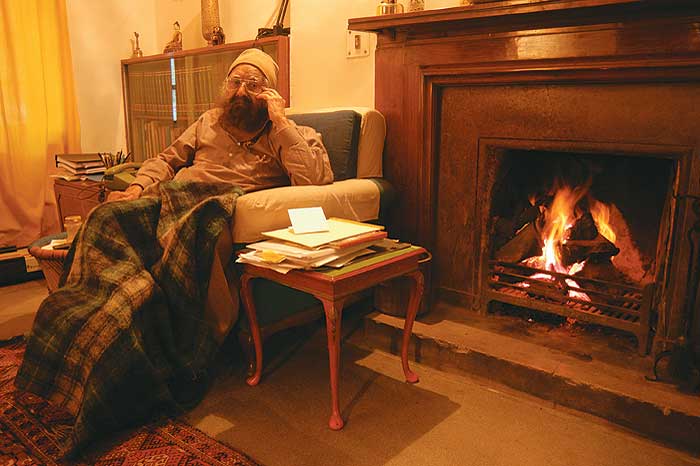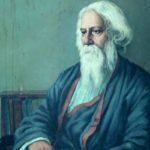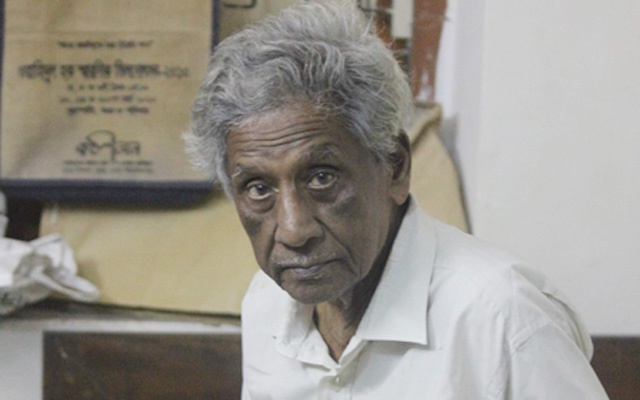Khushwant Singh has a kind of charm about him that you can’t resist. He will drive a wedge right through your heart and yet it will have a soothing effect. His lucid style, inimitable wit, biting satire, sharp insights and emotional arguments make a combination seldom seen on the pages of newspapers.
Yes, I am talking about the journalist that Khushwant Singh was, and the columns he wrote in that capacity, before he died aged 99 on March 20, 2014.
It’s not his sexual escapades that earned him notoriety as the “dirty old man of Indian journalism” – it’s his role as one of India’s most controversial journalists and his one-of-a-kind columns.
The general reader may know the man mostly as a novelist. Some of his novels and short story collections were bestsellers in India and Pakistan. I can rattle off quite a long list of his books but chances are you’re already familiar with it. His fame is partially due to his fascination with “sex, scotch and scholarships,” three of the recurring themes in his works of fiction and nonfiction. If you have read, for instance, “The Company of Women” (whose protagonist’s sexcapades are said to have caused early puberty in many young readers), you know what I mean. That brings us closer to our point of discussion.
Singh was remarkably fit for someone who lived longer than most of his contemporaries. He lived his life to its fullest. But it’s not his sexual escapades that earned him notoriety as the “dirty old man of Indian journalism” – it’s his role as one of India’s most controversial journalists and his one-of-a-kind columns.
Just a quick note: Singh served as the editor of The National Herald, the Hindustan Times and the Illustrated Weekly of India. The Illustrated Weekly enjoyed its golden era during his tenure with the circulation skyrocketing to 400,000 from just 65,000.
“With Malice towards One and All” is Singh’s signature column series that endeared him to millions of readers across borders. He ran the series for decades, which appeared on a weekly basis in leading Indian dailies and weeklies through syndication.
Each column dealt with three to four unconnected subject matters, starting with his thoughts on an important political/cultural/social/literary issue, followed by a memoir of his travels and then a liberal dose of adult jokes. Apart from the Malice columns, he wrote various other columns under various titles.
His adult jokes were mostly sent in by his readers which he would use in his own characteristic way. “Dirty” – you may say, but being Singh has its privileges. He could make the most divisive of subjects appear like a normal phenomenon, and was never afraid to write what other didactic, image-conscious columnists – whose pens he called “as limp as their penises” – would shy away from.
Singh was called dirty not only because he would sometimes use sexually explicit language and jokes in his columns; it was also because of his brutal honesty and ability to say whatever he believed in. There was no sugarcoating for Singh.
After the Delhi rape in 2012, when there was a near-unanimous demand in India to sentence the rapists to death, he chose to take a stand against the current: “Death sentence imposed on murderers has not brought down the incidence of murders – nor will it have any impact on the incidence of rape. The punishment for a rapist is to render him incapable of repeating his crime. He should be castrated and once for all be unable to repeat his crime!”
In another article, he said: “Prostitution should be legalised so that men who are unable to control their libido have other outlets to vend their lust (on) and not force it on unwilling women.” You may or may not agree with this line of thought, but his forceful argument will win him some points.
Dhiren Bhagat once jokingly wrote an “obituary” for Singh. Singh replied by writing a counter-obituary only after the former’s death. In that, rather than saying a few kind words about someone who died very young, he started by taking potshots at him and explained how he was just a show-off. His conclusion? “Penguin India is left poorer by a few thousand rupees!”
Mean? Not in the world of Singh. In his column titled “Hijab as emblem of backwardness,” he called Hijab an “irritant” – something that confines its wearer more than it liberates.
“I regard the Hijab as the emblem of jihalat (backwardness). The sooner Muslim women liberate themselves from it, the better,” he said. In another column, he said the subcontinent needs a Kemal Pasha who would abolish institutions that are “outdated,” such as Hijab.
“Death sentence imposed on murderers has not brought down the incidence of murders – nor will it have any impact on the incidence of rape. The punishment for a rapist is to render him incapable of repeating his crime. He should be castrated and once for all be unable to repeat his crime!”
You can imagine the angry protests that followed publication of the column. Hijab advocates showered him with hate mails and telegrams, calling him “atheist” and his columns “blasphemous.” Singh, as always, was past caring.
On another occasion, he raised quite a few eyebrows by his observation on the sex life of the Indians: “Indians have sex more often in their brains and not where it should be!”
If being sexual, controversial, provocative and nonconformist means being dirty, Singh was every inch of that. Dirty or not, however, one thing is obvious: Khushwant Singh was a guaranteed entertainer and the best bet around for a fun summer vacation. Check it out for yourself!












